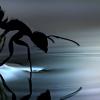Thanks for that.
I just found that line on the Wikipedia page, and it goes on to state that it is not uncommon for food items to be considered slightly toxic, including vitamin C, and that calcium propanoate can be used as a fungicide on fruit.
Perhaps I will run some experiments this summer.
I'll try growing mold on purpose on different mixtures of plaster, to see if it even works while submerged in plaster.
I usually wind up with several dozen Solenopsis queens... I'll divide them up and see if the ingredient appears to interfere with the development of the eggs and larvae.
I've read that calcium propanoate is considered a "pesticide" which threw me off at first. But any chemical used to combat a living thing is considered a "pesticide" even if that targeted living thing is only mold or fungus.
Also from Wikipedia:
Toxicity Class III[edit]
- slightly toxic
- Signal word: Caution, possibly followed by:
"Harmful if swallowed", "May be harmful if absorbed through the skin", "May be harmful if inhaled", or "May irritate eyes, nose, throat, and skin"
Class III materials are estimated to be fatal to an adult human at some dose in excess of 30 grams.















